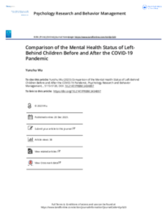Purpose:
To investigate and discuss the mental health status of left-behind children in Anhui Province, China, before and after the COVID-19 pandemic and analyze its influencing factors.
Methods:
A total of 82 left-behind children studying in grades 4 to 6 in Anhui Province, China were investigated by using the Symptom Check List-90 (SCL-90), Perceived Social Support Scale (PSSS) and Self-Esteem Scale (SES). Differences in the mental health status, perceived social support, and self-esteem of left-behind children before and after the COVID-19 pandemic were analyzed using the independent sample t-test. The relationship between mental health, perceived social support, and self-esteem before and after the pandemic was determined using the Pearson product-moment correlation test, and the factors influencing mental health before and after the pandemic were identified using regression analysis.
Results:
The SCL-90 scores of left-behind children during and after the pandemic were 134.45 ± 23.17 and 114.52 ± 22.56, respectively, indicating that the SCL-90 score during the pandemic was significantly higher than that after the pandemic. The perceived social support scores of left-behind children during and after the pandemic were 58.99 ± 12.45 and 65.57 ± 11.76, respectively, indicating that the score during the pandemic was significantly lower than that after the pandemic. The self-esteem scores of left-behind children during and after the pandemic were 25.04 ± 4.95 and 28.39 ± 3.84, respectively, indicating that the score during the pandemic was significantly lower than that after the pandemic. The SCL-90 scores before and after the pandemic were significantly negatively correlated with perceived social support and self-esteem. The regression analysis results showed that self-esteem and perceived social support together could explain 25% of variations in the SCL-90 score during the pandemic and 34% of variations in the SCL-90 score after the pandemic.
Conclusion:
The mental health level, perceived social support, and self-esteem of left-behind children improved after the pandemic compared with those during the pandemic. Good perceived social support and self-esteem can effectively promote the mental health of left-behind children.

